#Warren County Auditor
Text
A man with no experience running elections and who believes the 2020 election was stolen from Donald Trump, the 9/11 attack was faked, and QAnon is real has been chosen by a county in Iowa to oversee its elections, including the critical 2024 presidential election.
David Whipple was appointed last week by the Warren County Board of Supervisors to serve as Interim Warren County Auditor, a position responsible for overseeing elections in the county. The appointment was made in a special meeting after former Warren County Auditor Traci Vanderlinden announced her retirement last month.
One of the board supervisors, Crystal McIntyre, acknowledged in the meeting that it “looks weird” to be appointing Whipple—who she admitted knowing personally—but they voted for him anyway.
Whipple’s belief in baseless conspiracy theories was not secret or hidden. Days after the 2020 election, Whipple was sharing baseless allegations of voter fraud, according to screenshots of the posts published by the Iowa Starting Line website. On the same day, Whipple wrote a post calling President Joe Biden a “crooked pedophile child sniffer” where he referenced QAnon conspiracies about the President.
Whipple continued to post disinformation about the election and Biden in the following weeks and months, as well as anti-vaxx disinformation about the COVID-19 vaccination. On Jan. 2, 2021 he shared a link to a video entitled Q: The Plan To Save The World, a 2018 video that has become one of the foundational texts of the QAnon conspiracy movement.
On January 6, 2021, as the insurrection was taking place, Whipple shared a link to a video about the 9/11 terrorist attack on the World Trade Center. The video, entitled Nina Eleven, falsely claims the images broadcast on television of the planes slamming into the towers were computer generated.
All of these posts were freely accessible at the time of the Warren County board meeting on June 6, but have since been scrubbed.
Screenshots of the posts have been shared widely online, however, and have been used by the Warren County Iowa Democrats as part of their drive to obtain the 2,500 signatures necessary to call a special election to vote for a new auditor.
“If you don’t believe in elections how can you be in charge of elections?” Warren County Democratic Party Chair Jim Culbert said on local radio station KNIA-KRLS. “If you don’t think that they were fair and honest, how is that going to inform how you do the job? We just don’t know this guy, he came out of nowhere.”
The Warren County Board of Supervisors and Whipple did not immediately respond to VICE News’ request for comment on Whipple’s conspiratorial beliefs.
#us politics#news#vice news#iowa#David Whipple#republicans#conservatives#qanon#conspiracy theorists#Warren County Board of Supervisors#Warren County Auditor#Traci Vanderlinden#Crystal McIntyre#9/11 conspiracies#election conspiracists#anti-vaxx disinformation#Q: The Plan To Save The World#Nina Eleven#Jim Culbert#KNIA-KRLS#2023
10 notes
·
View notes
Text
Warren County residents want a special election to vote for a new county auditor after it came to light that newly appointed auditor David Whipple has a history of promoting conspiracy theories about 9/11 and the 2020 election.
In Iowa, county auditors oversee elections.
Whipple, who has no experience in government, was appointed to serve as auditor by the three-member Warren County Board of Supervisors during a special meeting on June 6. His term expires Dec. 31, 2024.
Besides Whipple’s lack of experience, Warren County residents and the county’s Democratic Party became more concerned with his appointment after they became aware of Whipple’s since-deleted social media posts where he shared various conspiracy theories about the election, QAnon, and even the Sept. 11 terrorist attack.
0 notes
Text
SAND TO FACE RECOUNT FROM HALBUR IN STATE AUDITOR’S RACE
SAND TO FACE RECOUNT FROM HALBUR IN STATE AUDITOR’S RACE
THE FINAL BATCH OF VOTES FROM TWO IOWA COUNTIES ARE IN AND ROB SAND APPEARS TO HAVE NARROWLY WON RE-ELECTION AS STATE AUDITOR.
ABOUT TWO-THOUSAND VOTES FROM WARREN COUNTY AND AROUND 800 VOTES FROM DES MOINES COUNTY WERE ADDED TO THE STATEWIDE TALLY ON THURDAY AFTERNOON.
THOSE UNOFFICIAL RESULTS SHOW SAND AHEAD OF REPUBLICAN CHALLENGER TODD HALBUR BY 26-HUNDRED-14 VOTES.
HALBUR WILL ASK FOR A…
View On WordPress
0 notes
Text
In case you get paywalled, here's the full text of the article:
A draft audit report circulated on Gateway Pundit and other conservative blogs that called for decertification of Maricopa County’s 2020 general election results is a fake, a Senate audit official confirmed.
The draft in question is similar to drafts obtained by the Capitol Times and other Arizona media outlets the night before the audit presentation last week but includes several deviations from those drafts, including a statement advocating for election decertification in the executive summary – language that also did not appear in the final report presented by Cyber Ninjas to Senate President Karen Fann, R-Prescott, and state Sen. Warren Petersen, R-Gilbert.
The draft – published alongside a Gateway Pundit article titled “Arizona Audit Final Report Was Watered Down” – includes the line “based on these factual findings, the election should not be certified, and the reported results are not reliable.”
“This is a fake document,” Senate audit liaison Randy Pullen said in a text message.
Pullen, former Republican Party of Arizona chairman, said “there was never a discussion about decertifying.
The fake draft is already making the rounds amongst audit supporters who believe the final report – which included no claims of election fraud and only called for election reforms, not decertification – didn’t go far enough.
Michigan Attorney Matthew DePerno, the lawyer behind a failed lawsuit alleging fraud in Antrim County, was one of the first individuals to circulate news of the draft on Twitter on Saturday.
“I have been told that Arizona attorney Cory [sic] Langhofer suppressed critical information from the audit report, including the statement that the election must be decertified,” DePerno posted, referring to Kory Langhofer, the Senate’s attorney.
Langhofer declined to comment. “I am not at liberty to comment on that because it’s privileged,” he said.
DePerno, who is running for Attorney General in Michigan, later shared a link to a post on the conservative blog Becker News that shares the same draft published by Gateway Pundit.
DePerno is no fringe player in pro-audit circles. Former President Donald Trump recently endorsed his candidacy for Michigan attorney general and Sen. Wendy Rogers, R-Flagstaff, cited a memo he wrote to justify her argument that the legislatures have the authority to decertify national elections.
It appears none of the websites that published the fake draft performed a basic fact check on the document before publishing, because Pullen, the Senate liasion, was not aware of the its existence before being contacted by the Capitol Times.
“There is no alternative report. Where is that coming from”? he asked. Pullen later reviewed the draft and confirmed it was a fake.
Cyber Ninjas issued a statement today to the same effect, stating
In a written statement issued today, Cyber Ninjas said auditors do not know the origins of the fake draft. “But it was not written by Cyber Ninjas CEO Doug Logan, nor was it in any version that was ever sent or shown to the Senate review,” the group said. The Cyber Ninjas also dispelled rumors circulated by some audit supporters on social media alleging that Senate attorney Kory Langhofer “suppressed” information about decertification and removed it from the final report. “This false version claims to be an earlier version of the Cyber Ninjas Executive Summary, but because of supposed threats from the Senate, it was not used. This is absolutely false,” the group said.
10 notes
·
View notes
Photo



Trumbull County Court House
161 High Street N.W.
Warren, Ohio 44481
The current Trumbull County Courthouse in Warren, Ohio, is the third temple of justice to occupy Warren's historic public square. Its design is Richardson Romanesque and features Ohio's largest common pleas courtroom. A disastrous fire on March 25, 1895 doomed the county's second courthouse. While the Packard Block on North Park Avenue served as a temporary home for the county, planning began for a new courthouse. The firm of LaBelle and French of Marion, Indiana, was selected as the architects and E.M. Campfield of Findley, Ohio, was awarded the contract to build the new edifice. The cornerstone was laid on Thanksgiving Day, November 28, 1895.
Amherst sandstone had been selected for the building. The giant stones were sawed to specification at a cutting mill erected in the park. Work on the courthouse ceased during the winter months of 1895 and 1896. Stonework on the tower began in August, 1896, with the copper roof installation beginning in September. The tower framework was completed on October 22, 1896, with the American flag flown from the superstructure.,,In November, the courthouse bell, weighing 1500 pounds, arrived, and the tower clocks were put in place. On January 25, 1897, the clocks were started at 4 p.m. - one year and ten months after the fire in the old building. The "statues of justice" arrived in time for the first statue to be placed on the east gable on March 4, 1897 - William McKinley's Presidential Inauguration Day. The county commissioners took possession of the courthouse on April 5, 1897. The courthouse was dedicated on May 10, 1897, at the opening of the Court's May term.
In the beginning of its first century of service, the Memorial Room on the east end of the courthouse’s first floor housed the Grand Army of the Republic, Bell-Harmon Post No. 36, and its auxiliary, the Women's Relief Corps No. 58. The Clerk of Courts office now occupies this space. On the west end, the Assembly Room housed the Warren County Public Library until 1906, followed by the National Woman Suffrage Association until 1909. The Probate Court is located here. The County Surveyor (Engineer) and rented offices originally occupied the remaining rooms.
Various county offices, including the Commissioners, Treasurer, and Recorder had rooms on the second floor. The Auditor's office on the west end was decorated in Empire style with Sea Green effects. It originally had one of the building's two telephones. Common Pleas Courtroom No. 3 is in this renovated space. The east courtroom with Louis XIV style ornamentation in Cerulean Blue and Old Rose was the Probate Court, now Common Pleas Courtroom No. 4. The Commissioner's office is now the Petit Jury room and features an interesting Renaissance frieze with dragons entwined.
The Sheriff, Prosecutor, and Law Library had rooms on the north side of the third floor, while the Clerk of Courts on the south side had a private elevated passageway to Courtroom No. 1, which is Ohio's largest. Olive and Chamois tones dominate the ornamental style of Renaissance decoration in Courtroom No. 1. The judge's oak bench duplicates designs from the exterior stone carvings. Paneled oak wainscotting, oak tables, and the bar rail have been reconditioned to their initial splendor. A beautiful oak screen decorates the west wall. Common Pleas Courtroom No. 2, also in paneled oak, originally served as a circuit courtroom. It is decorated in the Renaissance order with Quiet Green effects. The fireplace showcases an original mantelpiece with green tile. Two original brass thermostats have been restored here. Original courthouse furniture and the original probate bench complement the Magistrate's Room.
The corridors display the Romanesque colors of Terra Cotta tones above the white marble wainscot. The Romanesque stairways feature pink Tennessee marble. The ceilings and cornices of the halls, various offices, and third floor courtrooms are of stamped metal. Gold and aluminum paint highlights this relief work. Doors have knobs bearing the monogram TC for Trumbull County. The hallways retain their original marble mosaic flooring. Combination gas and electric fixtures originally lighted the courthouse. Packard incandescent lamps were used throughout the building. The building was warmed by steam heat piped into the building from the power plant on the north side of High street.
In 1993, current commissioners Angelo and O'Brien and former commissioner Arthuer Magee selected Dijk, Pace, Westlake and Partners of Cleveland as architects. Jack Gibson Construction Company of Warren was the general contractor for the renovation of the structure. Now refurbished with its public rooms restored to their original glory, the courthouse stands ready to serve its twenty-first century occupants. The Trumbull County Courthouse is listed on the National Historical Register of the U.S. Department of Interior.
1 note
·
View note
Text
Dominion Voting Systems Received $120 Million From 19 States And 133 Local Governments To Provide Election Services (2017-2019)
New Post has been published on https://perfectirishgifts.com/dominion-voting-systems-received-120-million-from-19-states-and-133-local-governments-to-provide-election-services-2017-2019/
Dominion Voting Systems Received $120 Million From 19 States And 133 Local Governments To Provide Election Services (2017-2019)
SAVANNAH, GEORGIA: People cheer at a rally on December 04, 2020 in Savannah, Georgia. (Photo by … [] Spencer Platt/Getty Images)
Key points:
Dominion Voting Systems is the second largest vendor in the non-transparent and entrenched election system industry where three vendors control 88-percent of the market.
Recent Dominion contracts with major counties and cities across America set service agreements for years or even decades—helping lock-in the company’s dominant market position and prevent competition.
Dominion Voting Systems was paid $118.3 million to provide election services during the past three years, according to public records. Their revenues came from 19 states and 133 local governments including counties, cities, and even a couple of school districts.
Since presidential election of 2020, Dominion has come under wide public scrutiny, particularly in Georgia, Arizona, Michigan, Pennsylvania, and Wisconsin—critical toss-up states with close winning margins.
In their Dunn & Bradstreet filings, Dominion claimed annual sales of $36.5 million with contracts in 22 states and 600 local jurisdictions. However, the Penn Wharton Public Policy Initiative estimated that Dominion was in 1,645 jurisdictions with $100 million in annual revenues (2018).
So, our auditors at OpenTheBooks.com tracked Dominion’s revenues using state and local government spending disclosures, i.e. their checkbooks. (Dominion is a private company and, therefore, is not required to disclose financials. However, public bodies must be transparent, because they spend taxpayer money.)
Compiling the records required open record requests in 49 of the 50 states and in 11,400 local governments. Only California, which we are suing, rejected our sunshine request.
Here is a state-by-state description of our findings. (Download our raw payment data spanning 2017 through 2019.)
Georgia: In 2019, a $107 million ten-year contract with Dominion procured by the Secretary of State covers 30,000 touch screen voting machines and the installation of a “verified paper ballot” voting system. $89 million in payments were front-loaded into the first two-years of the contract.
Costs, fees, and payments to Dominion Voting Systems as contracted by the state of Georgia in 2019.
New Mexico: Dominion received $52 million from the state government. Services included the full suite of hardware and software information-technology agreements.
Michigan: $31.5 million flowed from the state government ($30.8 million) and 22 localities over the last three years. Top spending local governments included Detroit ($457,880); Livonia ($65,310); Saginaw ($53,314); Dearborn ($22,975) and Antrim County ($20,056).
Services included machines, equipment repair, election services, ballot marking printers, vote tabulators and ballot boxes, modem cell services contracts, election coding, and voting machine coding.
Nevada: Clark County, the largest in Nevada, contracted for $28.7 million to have the company run its elections through 2032. The Secretary of State’s Office paid Dominion for $510,130.
California: In 2019, the County of Santa Clara contracted with Dominion for up to $16.2 million to run their election services for the next eight-years. San Francisco’s 2019 contract covers five-years for an amount not to exceed $12.7 million.
$11.1 million in payments to Dominion came from just 15 counties and cities. The largest payer was Alameda ($5.2 million). Other counties included San Francisco ($4.2 million, Butte ($376), Glenn ($42,350), Monterey ($233,291), San Benito ($173,049), Santa Cruz ($583), Shasta ($3,975), Sierra ($9,571), Siskiyou ($127,314), Kern ($127,267), San Luis Obispo ($500,536), and San Mateo ($457,703).
Illinois: Cook County, the second most populous county in the country, signed a $31 million ten-year contract with Dominion in 2018. Competitor Election Systems & Software (ES&S) sued alleging equipment scanning problems and lack of state certification; later, ES&S dropped the case. Chicago has a ten-year $22 million deal.
From 2017-2019, payments of $6.2 million from six counties and cities flowed to Dominion. Cook County ($5.5 million) and the City of Chicago ($533,018) were the largest payers. Other counties included DuPage ($70,520), Kankakee ($9,900), Macoupin County ($15,153), and Winnebago ($18,900).
Arizona: We found the 2019-2022 contract in Maricopa County at total taxpayer cost of $6.1 million over three-years. The City of Phoenix also paid Dominion $48,300.
New York: The state spent $95.8 million with Dominion from 2008 through 2014 then renewed the contract through 2021.
From 2017-2019, $4.4 million from 44 government entities paid Dominion. Here are the top five counties: Suffolk ($1.1 million), Niagara ($539,334), Orange ($336,480), Monroe ($301,435), and Madison ($300,884). Interestingly, there were six school districts paying Dominion for election services.
Purchase descriptions ranged from batteries, compact flash memory cards, receipt paper for voting machines, warranty and support for “imagecast voting,” EMS 3-day training, absentee central count ballots and election day ballots, “pre marked test ballots,” firmware and hardware warranty, voting systems, and much more.
Pennsylvania: $1.1 million from five counties contracted with Dominion: Armstrong ($701,560), Crawford ($201,880), Washington ($121,880), Somerset County ($39,286), and Warren ($10,532). The disclosures did not list the services purchased.
Wisconsin: Dominion voting machines are used in the counties of Racine, Washington, and Ozaukee. In the large counties of Dane and Milwaukee, ES&S machines are used.
We were not able to capture government checkbook data on Dominion expenditures in Wisconsin.
From Policy in Perfectirishgifts
0 notes
Text
Ranked choice voting, explained
New Post has been published on https://appradab.com/ranked-choice-voting-explained/
Ranked choice voting, explained



Here’s what to know about the system.
It lets voters literally rank their choices in order of preference, marking candidates as their first, second and third choice picks (and so on).
The winner must have a majority (more than 50% of the votes) rather than a plurality (simply the most votes).
In Maine, ranked choice only takes effect when three or more candidates are on the ballot. Voting is counted by round, with lowest-ranked candidates eliminated in each round until only two candidates remain.
How long does it take?
On election night, if there is no clear winner with more than 50% of the vote, counting goes into ranked choice voting tabulation rounds. In Maine, couriers are sent around the state to either collect actual ballots or memory devices and brought to a secure location at the State Capitol in Augusta. There, high speed tabulators count the results and determine the winner.
“The process takes about a week, a week and a half,” Kristen Muszynski, communications director for Maine’s secretary of state, told Appradab.
Do you have to rank every single candidate?
No. A voter only needs to mark a first choice, or as many as they want.
But a voter can only put one candidate first, or second and so on. In Maine, If you choose two candidates for your first choice, it counts as an over vote and your vote will not count, “since your intent for your first choice cannot be determined.”
Why vote this way?
Advocates say it helps prevent spoiler candidates — and ensures the candidate with the most support wins, rather than one who emerges from a crowded field with a small plurality of votes.
It can be especially helpful in crowded primaries or elections where margins of victory are very small, ensuring the candidate has the support of the majority, rather than a small plurality.
Who else does it?
At least 18 municipalities across the country, including mayor and city council elections in Minneapolis and St. Paul, Minnesota and the mayor, city council and city auditor elections in Berkeley, California, according to a tally by FairVote.org, a group advocating for ranked choice voting in the US.
New York City is poised to use it in all city primary and special elections starting in 2021.
What’s the argument against it?
Two California governors have vetoed measures that would implement ranked choice voting for cities and towns across the state, even though it was already in use by San Francisco, Oakland, Berkeley and San Leandro.
Gov. Jerry Brown vetoed the bill in 2016, calling it “overly complicated and confusing. I believe it deprives voters of genuinely informed choice.”
In 2019, Gov. Gavin Newsom issued another veto for a measure that would have allowed ranked choice voting to be used in local elections, echoing the concern that it adds to voter confusion. “The state would benefit from learning more from charter cities who use ranked choice voting before broadly expanding the system,” Newsom wrote in the veto message.
Who else is thinking about it?
It is on the statewide ballot in Massachusetts this fall. If voters approve it — and barring legal challenge — it would take effect in 2022 for primary and general elections for all Massachusetts statewide offices, state legislative offices, federal congressional offices and certain other offices.
It would not apply to elections for president, county commissioner or regional district school committee member.
The city of Cambridge, Massachusetts, has used it to elect its city councilors and school committee members since the 1940s. Cambridge resident (and Massachusetts Senator) Elizabeth Warren recently backed Massachusetts’ effort in an op-ed with Maryland Rep. Jamie Raskin. Takoma Park, which is in Raskin’s congressional district, has used ranked choice voting since 2007 for all mayor and city council elections.
“By requiring the winner to reach more than 50 percent of the vote, ranked-choice voting ensures the winning candidate is the one with the broadest appeal to the majority of voters,” Warren and Raskin wrote. “The ability to mobilize the broadest and deepest appeal across the electorate would replace the ability to target a passionate minority constituency, which may be extreme or nonrepresentative from the standpoint of most voters as the key to winning.”
0 notes
Text
Lincoln Forgeries
“What is a forgery? It is the bringing forward something in writing or in print purporting to be of certain effect when it is altogether untrue….If you come forward with a letter purporting to be written by me which I never wrote, there is [a] forgery.” — Abraham Lincoln. Lincoln-Douglas debate at Charleston, Illinois, September 18, 1858
In the more than 150 years since Lincoln’s death, many talented forgers have “come forward” with letters and other documents supposedly written or signed by “A Lincoln.” The Lincoln Financial Foundation Collection holds a collection of such items, purchased as known forgeries as examples of the forgers’ “art.”
This bound volume of the Utica Christian Magazine from 1813-14 contains 13 forged Lincoln signatures—one on the first page of each issue of the magazine and one on the front flyleaf. The volume was owned by well-known Lincoln collector John E. Burton, who believed the signatures to be genuine and noted that Lincoln “evidently treasured his few books or he would not have been so careful to sign or initial each.” Burton apparently didn’t find it strange that the sixteenth president “treasured” an evangelical Christian magazine that was published when he was four years old.
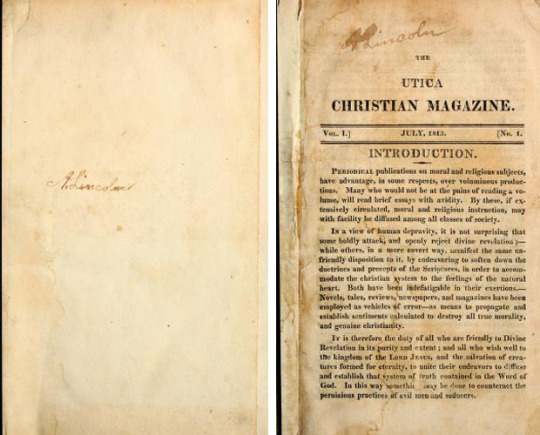

This copy of the Gardener’s Almanac for 1850 also bears a forged Lincoln signature on its cover.
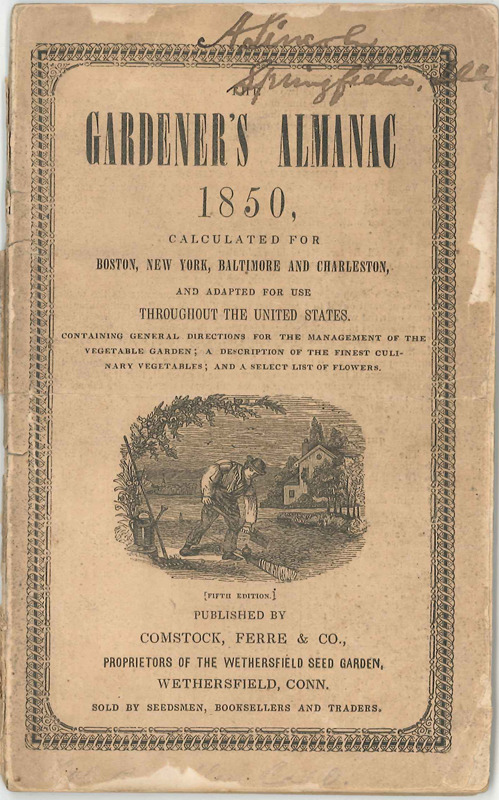
A letter purportedly written by Lincoln to his brother-in-law, Ninian W. Edwards, from City Point, Virginia, on September 2, 1862, notes the appointment of Rev. William Hunter as chaplain for the 109th Ohio Volunteer Infantry, which had begun organizing in the fall of 1862. The regiment recruited only enough men to form a single company, however, so the attempt to form the 109th ceased, and the recruits were transferred to make up Company I of the 113th Regiment. The 113th regimental roster lists Joseph Morris as chaplain, serving from September 16, 1862, to July 6, 1865. Not surprisingly, this forgery is not found in the Collected Works of Abraham Lincoln. The identity of the forger is not known.
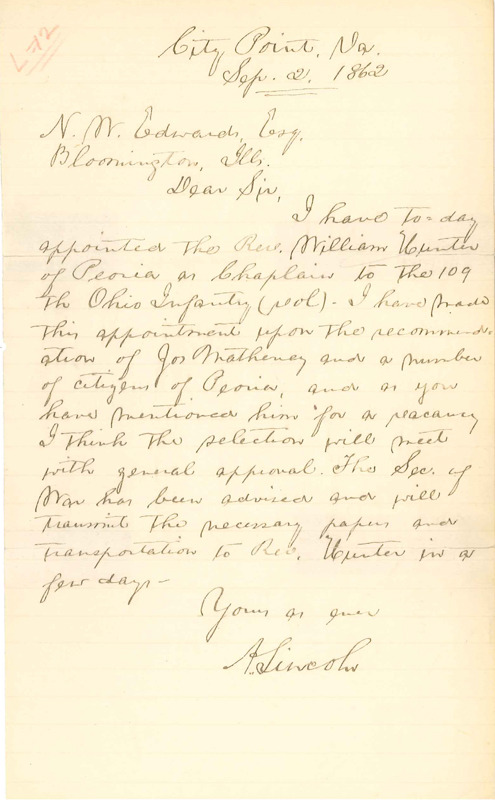
Another unidentified forger created this generic “note of introduction” on Executive Mansion stationary.
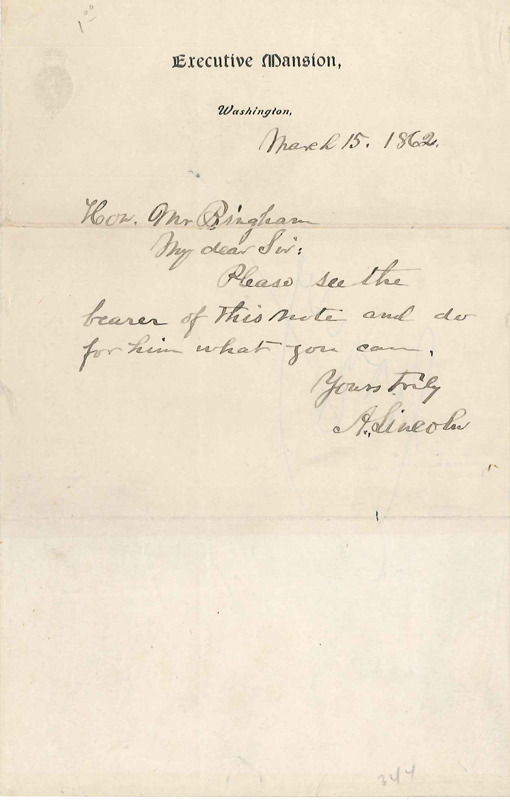
Louis A. Warren, the first director of what is now the Lincoln Financial Foundation Collection, purchased several forgeries produced in 1934 by an unidentified forger. The “Champaign Circuit” document below is a booklet of 10 pages purportedly written in “Lincoln’s hand” and is, according to Warren “an exceedingly fine example of the forger’s art.”
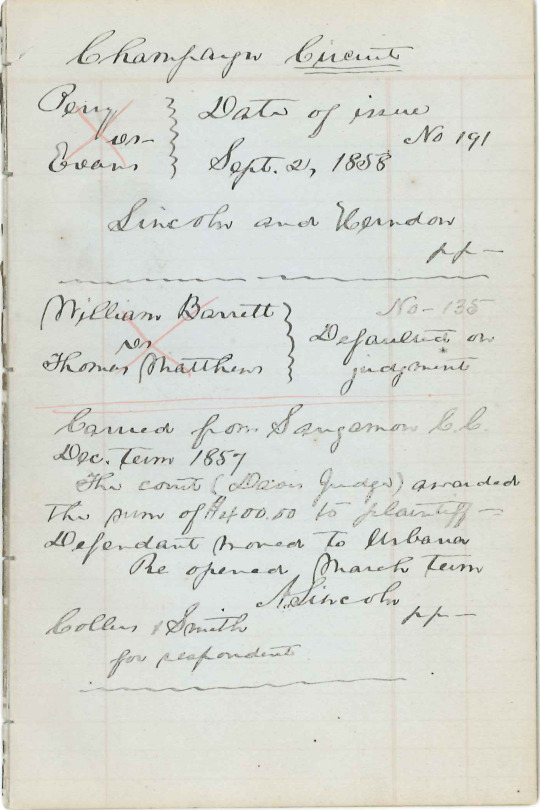
Another of the 1934 forgeries was created on chemically treated paper to give it the appearance of age.
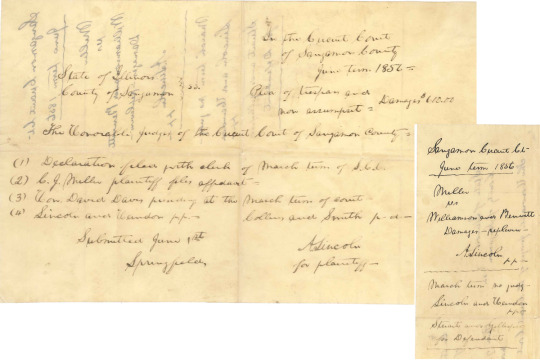
One of the best-known examples of Lincoln forgeries may be those produced from items owned by William P. Brown. Brown served briefly as Mary Todd Lincoln’s coachman and then claimed to possess a number of books, maps, and other items given to him by the former first lady in 1866. Around 1930, Eugene Field II and forger Henry Stickles approached the 93-year-old Brown at his home in Michigan. The two men convinced Brown that he needed sign each item and to have all of them notarized swearing to their authenticity. On August 13, 1933, a notary in Muskegon County, Michigan, added a statement to each item above Brown’s signature attesting that the item had been given to Brown by Mary Lincoln and that “the signature is genuine.” Field and Stickler then purchased the items from Brown and took them to Chicago where Stickler forged “A Lincoln” on each one. Potential buyers soon suspected—and then confirmed—the signatures were forged. This “signed” photograph and engraving of Lincoln, pocket Geological Map of Ohio, and 1848 map of North American are among those forged items.
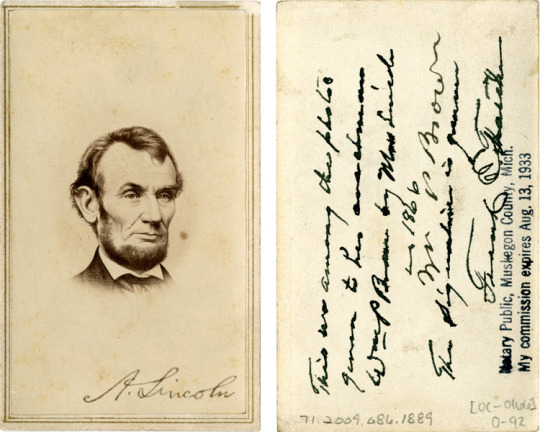

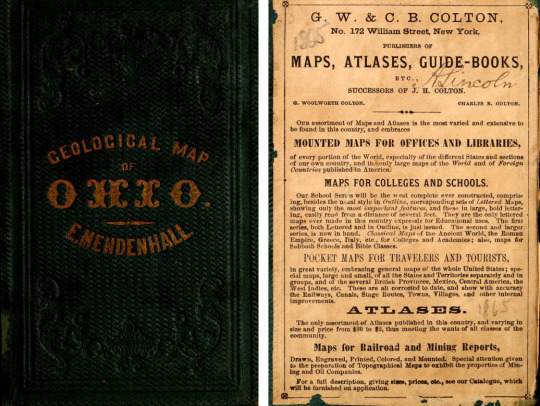

Perhaps the best forger of Lincoln documents was Joseph Cosey, who created documents “by” Benjamin Franklin, Mark Twain, Thomas Jefferson, and others in addition to Abraham Lincoln. Over his career of two decades, Cosey created hundreds of documents that fooled the experts. His forgeries were so good, they have become items of value in their own right and have been exhibited at the New York Public Library and the Library of Congress. This lengthy legal document titled “The People v The Auditor of Illinois” may be the best of them all. It was purchased by the Lincoln collection as a forgery for $75. For it, Cosey used 19th-century paper he had cut from a manuscript genealogy volume in the New York Public Library and ink made from iron rust filings. It is a prime example of the forger’s mastery of Lincoln’s handwriting.
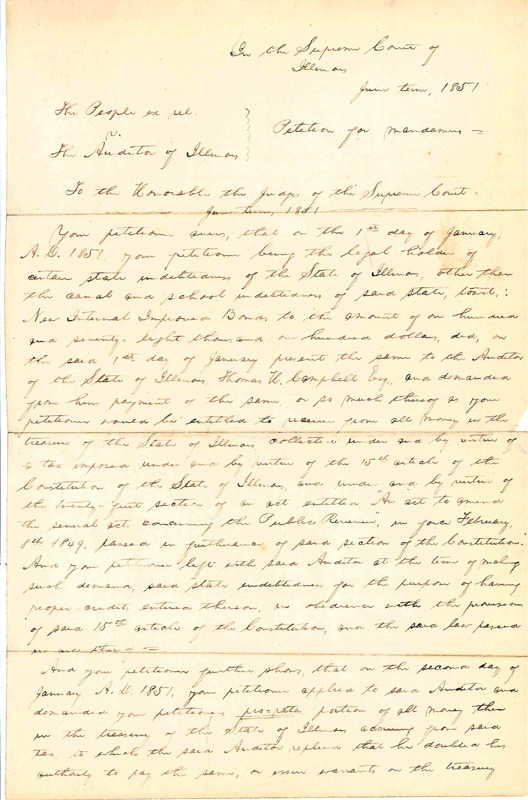
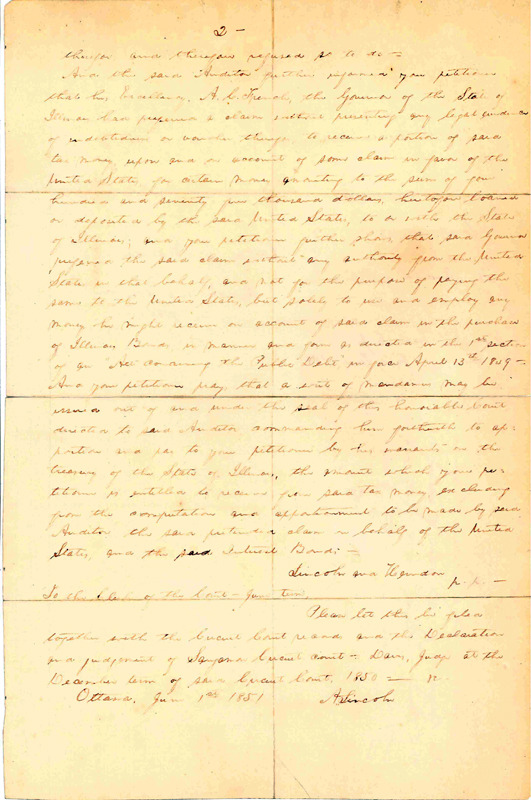

Cosey’s talent as a forger did not make him rich. He spent his life in New York City flophouses addicted to alcohol and drugs and selling his forgeries for whatever dealers offered, as high as $50 or as low as $2. He was in and out of prison for a variety of crimes—motorcycle theft, check forgery, carrying a concealed weapon, grand larceny. But he was not arrested for historic document forgery until 1937 when he tried to sell a “Lincoln” document to a New York stamp dealer. He was sentenced to three years in prison, served less than one, and continued to forge documents into the 1940s. He died in 1950. His forgeries, however, live on.
8 notes
·
View notes
Text
Ohio County Auditors to Explore Blockchain-Based Real Estate System
New Post has been published on http://blog.hodlthrive.com/?p=185
Ohio County Auditors to Explore Blockchain-Based Real Estate System
Ohio County Auditors to Explore Blockchain-Based Real Estate System
The County Auditors’ Association of Ohio (CAAO)
has announced the formation of a working group to study the use of blockchain for the effective transfer of property deeds. The news was reported on Feb. 21 by Ohio-based blockchain startup SafeChain — the technical advisor for the multi-county initiative.
The association’s collaborative effort will reportedly test the use of blockchain technology to bring efficiency gains to the execution and management of real estate transactions and the transfer of land titles across multiple counties. Their ongoing projects will be reportedly be reviewed by SafeChain member Tony Franco as they work to set goals and establish operating principle for the technology’s prospective use. CAAO, chaired by Warren County Auditor Matt Nolan, comprises thirteen Ohio county auditors, whose role as public officials includes oversight of the financial books and records of all county officers, as well as administering their respective counties’ budgets.
CAAO chair, Matt Nolan, was quoted in the press release as saying:
“We have a committed group […] to enhance technology and improve government operations to the benefit of the taxpayer. CAAO has set an extremely high standard for getting involved in technology projects due to the need to recognize its members’ diverse needs; this makes the formation of this working group particularly noteworthy.”
To press time, members of the CAAO have not responded to Cointelegraph’s request for comment on the development. As previously reported, the state of Ohio has made a bid to position itself at the fore of blockchain and cryptocurrency adoption, becoming the reported first state to accept Bitcoin (BTC) for tax payments in November 2018. In December, a total of seven Ohio funds pledged to invest over $300 million into blockchain startups through 2021.
Earlier in 2018, Ohio House of Representatives Speaker Ryan Smith convened a group of lawmakers, industry and academic figures to discuss positioning the state as a pro-innovation hub for blockchain. Alongside SafeChain, a gamut of startups are developing blockchain-powered real estate solutions, including the platform RealBlocks, which closed a $3.1 million seed funding round backed by digital assets manager Morgan Creek Digital this January.
Article Produced By
Marie Huillet
Marie Huillet is an independent filmmaker, with a background in journalism and publishing. Nomadic by nature, she’s lived in five different countries this decade. She’s fascinated by Blockchain technologies’ potential to reshape all aspects of our lives.
https://cointelegraph.com/news/ohio-county-auditors-to-explore-blockchain-based-real-estate-system
Deb Williams (hodlthrive)
0 notes
Text
Real Estate Transfers | News, Sports, Jobs
Real Estate Transfers | News, Sports, Jobs
[ad_1]
<
div id=”article_content”>
<!– SHOW ARTICLE
–>
Real estate transfers were recorded in Jefferson County include:
Auditor of Jefferson County to Michael Cionni, part lot 211, A,C. Jones.
Auditor of Jefferson County to Michael Cionni, .039 acre, Warren Township.
Auditor of Jefferson County to Michael…
View On WordPress
0 notes
Text
Friday Footnotes: KPMG Switcheroo; Deloitte’s Gender Pay Problem; Death to The Big 4 Oligopoly | 9.27.19
KPMG switches 820 UK staff from advisory to audit [Financial Times] KPMG has moved 800 staff and about 20 partners from its advisory division into its audit department in preparation for a possible forced break-up. Any consultant who spends more than 10 per cent of their time advising auditors will now sit within the audit department in a move towards a “more separate future”, according to a person briefed on the firm’s internal communications.
PwC Considers Changes to U.K. Auditor Pay to Avoid Conflicts of Interest [Wall Street Journal] PricewaterhouseCoopers LLP is considering changes to how its U.K. audit partners are being remunerated to avoid potential conflicts of interest. The potential changes to auditor partners’ pay and bonuses are part of a wider review of how its U.K. business is operating.
Mylan Misled Investors Over EpiPen Pricing Probe, SEC Says [Bloomberg] Mylan NV misled investors for at least a year about a Justice Department investigation into the allergy shot EpiPen that would eventually cost the company nearly $500 million, the U.S. Securities and Exchange Commission said Friday. The settlement appears to close one part of a long-running saga over a product that boosted Mylan’s sales but also brought controversy. Under the agreement with the SEC, first disclosed as a settlement in principle by Mylan in July, the drugmaker will pay $30 million.
Judge: Former Mason mayor, Ohio lawmaker can seek CPA license he lost after conviction [Dayton Daily News] A Warren County judge said Thursday that a former Mason mayor and Ohio lawmaker is allowed to again seek the CPA license he lost four years ago after being convicted on felony theft, perjury and securities-related charges. Pete Beck, 66, of Mason, petitioned the Warren County Common Pleas Court for a Certificate of Qualification of Employment (CQE), which is the process for a person convicted of a felony or misdemeanor to apply to the court to lift the collateral sanction barring him or her from consideration of employment in a certain field.
Big Four accountants facing changing times [Financial Times] The Big Four accountants have enjoyed an oligopoly over the audits of the largest listed companies in the UK and US, with some relationships dating back more than a century. But amid increasing scrutiny from politicians and regulators in the wake of high-profile corporate collapses, structural change, at least in the UK, looks certain.
Deloitte total gender earnings gap is 39.3% [economia] Deloitte’s 2019 mean pay gap is 18.7% (18.1% in 2018) and the median pay gap is 16.1%, same as last year. The firm’s median bonus gap is 35.1%, down from 37.5% in 2018 and its mean bonus gap is 51.1% (52.3% in 2018). In 2019, 41% of all partner promotions were women and 34% of director promotions were women. Less than a quarter (21%) of partners are women and less than a third (30%) of directors are women.
The future is now for audit [Accounting Today] One important guiding principle to remember: technology must enhance professional judgement, but not replace it.
Prosecutors agree to pause in subpoena for Trump tax returns [CNBC] In a letter Thursday to Manhattan federal court Judge Victor Marrero, a prosecutor in DA Cyrus Vance Jr.’s office wrote that “the parties have reached a temporary agreement” to “forbear enforcement” of the subpoena to produce years of Trump’s financial documents. Prosecutors will hold off trying to enforce the subpoena until Oct. 7 at 1 p.m. ET — or until two business days after the judge rules on whether subpoeane should be permanently barred or whether it can be enforced over Trump’s objection.
The post Friday Footnotes: KPMG Switcheroo; Deloitte’s Gender Pay Problem; Death to The Big 4 Oligopoly | 9.27.19 appeared first on Going Concern.
republished from Going Concern
0 notes
Text
As Joe Biden Eyes 2020 Run, One Challenge Haunts Him: Money
This post was originally published on this site
NEW YORK (AP) — On the cusp of another White House run, Joe Biden faces a daunting challenge that could complicate his path to the 2020 Democratic presidential nomination: money.
Those close to the former vice president believe he would start off at a fundraising disadvantage compared to would-be rivals, whose campaigns have benefited from an early flood of small-dollar donations from the most liberal wing of the party. Biden, a 76-year-old lifetime politician with strong connections to the party’s establishment, would be forced to rely on an “old-school grind-it-out” plan to generate campaign cash from wealthy individual donors, according to a person with direct knowledge of Biden’s thinking.
Questions about money are among the nagging issues Biden is still considering as he weighs launching a campaign. He’s decamped this week to St. Croix, a favorite Biden family vacation spot in the Caribbean, to discuss the remaining roadblocks with his wife, Jill.
Biden has long disliked the time-intensive process of political fundraising. But with virtually no campaign operation in key states, he’d need to generate millions of dollars in a matter of weeks should he enter what is expected to be the most expensive presidential campaign in U.S. history.
“He obviously has a lot of friends among the Democratic donor community,” said David Axelrod, one of former President Barack Obama’s top political advisers. “But fundraising today is turbo-charged by social media. He’s not of the social media generation.”
The fundraising question comes as Biden allies across the country feel an increasing sense of urgency for the Democratic heavyweight to declare his intentions. He has repeatedly hinted that he’s close to making a decision, but those close to him now believe that an announcement, which some expected in January, might be delayed until April.
Democrats in key primary states are warning that it’s becoming more difficult to persuade Biden holdouts to be patient as a crowded field of presidential contenders such as Massachusetts Sen. Elizabeth Warren, California Sen. Kamala Harris and Vermont Sen. Bernie Sanders actively fight for their support.
In South Carolina, which holds the first primary contest in the South, Charleston County Democratic Party Chairman Brady Quirk-Garvan said Biden’s indecision has created a holding pattern for potential staffers and supporters. As time drags on, he said, he’s fielding calls from some who are confused by Biden’s indecision.
“Several have said it’s concerning that he can’t seem to make up his mind,” Quirk-Garvan said. “If you’re going to run for president, most people want someone who’s pretty damn sure they want to be president.”
Biden has made clear to his family, friends and advisers that he wants to run, but he has held off giving his team the final go-ahead to launch a campaign. Among the factors giving him pause is concern about the impact a presidential run would have on his family, particularly given his son Hunter’s complicated personal history.
Even so, Biden adviser Steve Ricchetti has been signaling to potential Democratic rivals that Biden is expected to run. Other advisers including Greg Schultz and Peter Kavanaugh have been in regular contact with potential staff across the country to ensure Biden could quickly ramp up a national organization.
Those close to Biden expect him to signal his decision — at least internally — in the coming days to be followed by an intense period of hiring ahead of an April announcement should he decide to run.
Biden’s likely entry into the race was among the factors that led former New York City Mayor Michael Bloomberg to decide this week that he would not launch a campaign. Biden and Bloomberg spoke after the former mayor announced his decision, according to a person with knowledge of the conversation.
That person, like others in the story, spoke to The Associated Press on condition of anonymity because they were not authorized to publicly discuss private conversations.
Biden has openly raised questions about the social media and fundraising landscape, which has changed dramatically since he first joined Obama on the Democrats’ 2008 presidential ticket.
Several 2020 Democratic contenders have condemned super PACs in recent weeks. Warren, who has been struggling to raise money, took it a step further late last month, vowing not to court wealthy donors at all.
Biden acknowledged during a recent appearance at the University of Delaware that fundraising is a major consideration.
“We also are making a decision on whether or not we can fund this campaign on my conditions because I will not be part of a super PAC — and to see whether or not it’s realistic,” Biden said. “An awful lot of people have offered to help — the people, who are usually the biggest donors in the Democratic Party, and, I might add, some major Republican folks.”
A frequent headliner on the Democratic money circuit, Biden is well-known among donors but does not have a pool of big-dollar fundraisers lined up ready to commit to his campaign.
And his fundraising track record is underwhelming at best.
He faced little more than token opposition in his long run as a Delaware senator, requiring a relatively light fundraising burden. And in his 2008 presidential run, Biden raised barely half of the $20 million fundraising goal he set before dropping out of the race following a weak finish in the Iowa caucuses.
He was outraised by four other Democratic candidates in the final three months of his campaign, according to the Center for Responsive Politics.
With no clear front-runner in the crowded 2020 Democratic field, many of Obama’s donors are holding off on making commitments to one candidate or plan to give smaller amounts to multiple candidates in the coming months. Biden’s entry into the race is unlikely to change that approach, according to a Democrat who has spoken to several Obama donors.
But at least one Obama donor, Don Peebles, a two-time member of the former president’s national finance team, expressed confidence in Biden’s fundraising ability.
“I think he’d raise more money than several of the top candidates combined,” Peebles said, vowing to support Biden if he runs. “He’s the best chance that the Democrats have to win in November.”
Some Biden loyalists are not as patient.
In Iowa, Roxana Moritz, who was part of Biden’s Iowa steering committee during his failed 2008 bid, expressed concern that by waiting so long, Biden was allowing other candidates to peel off some of his supporters.
“The longer it goes, the harder it gets” for the former vice president to consolidate support, said Mortiz, the Scott County auditor.
While she’s still certain to support Biden if he runs, Moritz is getting anxious.
“I wish that he would be clear on his plans,” she said.
Pace reported from Washington. Associated Press writers Meg Kinnard in Columbia, S.C.; Alexandra Jaffe in Des Moines, Iowa; and Hunter Woodall in Manchester, N.H., contributed to this report.
The post As Joe Biden Eyes 2020 Run, One Challenge Haunts Him: Money appeared first on The Chestnut Post.
from The Chestnut Post https://thechestnutpost.com/news/as-joe-biden-eyes-2020-run-one-challenge-haunts-him-money/
0 notes
Text
Biden Eyes Fundraising Challenge Amid New Sense of Urgency
On the cusp of another White House run, Joe Biden faces a daunting challenge that could complicate his path to the 2020 Democratic presidential nomination: money.
Those close to the former vice president believe he would start off at a fundraising disadvantage compared to would-be rivals, whose campaigns have benefited from an early flood of small-dollar donations from the most liberal wing of the party. Biden, a 76-year-old lifetime politician with strong connections to the party's establishment, would be forced to rely on an "old-school grind-it-out" plan to generate campaign cash from wealthy individual donors, according to a person with direct knowledge of Biden's thinking.
Ralph Hall, Oldest-Ever Member of US House, Dead at Age 95
Questions about money are among the nagging issues Biden is still considering as he weighs launching a campaign. He's decamped this week to St. Croix, a favorite Biden family vacation spot in the Caribbean, to discuss the remaining roadblocks with his wife, Jill.
Biden has long disliked the time-intensive process of political fundraising. But with virtually no campaign operation in key states, he'd need to generate millions of dollars in a matter of weeks should he enter what is expected to be the most expensive presidential campaign in U.S. history.
Cohen Sues Trump Organization, Says It Owes Him Nearly $2M
"He obviously has a lot of friends among the Democratic donor community," said David Axelrod, one of former President Barack Obama's top political advisers. "But fundraising today is turbo-charged by social media. He's not of the social media generation."
The fundraising question comes as Biden allies across the country feel an increasing sense of urgency for the Democratic heavyweight to declare his intentions. He has repeatedly hinted that he's close to making a decision, but those close to him now believe that an announcement, which some expected in January, might be delayed until April.
Ex-Trump Campaign Boss Manafort Sentenced to 47 Months
Democrats in key primary states are warning that it's becoming more difficult to persuade Biden holdouts to be patient as a crowded field of presidential contenders such as Massachusetts Sen. Elizabeth Warren, California Sen. Kamala Harris and Vermont Sen. Bernie Sanders actively fight for their support.
In South Carolina, which holds the first primary contest in the South, Charleston County Democratic Party Chairman Brady Quirk-Garvan said Biden's indecision has created a holding pattern for potential staffers and supporters. As time drags on, he said, he's fielding calls from some who are confused by Biden's indecision.
"Several have said it's concerning that he can't seem to make up his mind," Quirk-Garvan said. "If you're going to run for president, most people want someone who's pretty damn sure they want to be president."
Biden has made clear to his family, friends and advisers that he wants to run, but he has held off giving his team the final go-ahead to launch a campaign. Among the factors giving him pause is concern about the impact a presidential run would have on his family, particularly given his son Hunter's complicated personal history.
Even so, Biden adviser Steve Ricchetti has been signaling to potential Democratic rivals that Biden is expected to run. Other advisers including Greg Schultz and Peter Kavanaugh have been in regular contact with potential staff across the country to ensure Biden could quickly ramp up a national organization.
Those close to Biden expect him to signal his decision in the coming days, to be followed by an intense period of hiring ahead of an April announcement should he decide to run.
Biden's likely entry into the race was among the factors that led former New York City Mayor Michael Bloomberg to decide this week that he would not launch a campaign. Biden and Bloomberg spoke after the former mayor announced his decision, according to a person with knowledge of the conversation.
That person, like others in the story, spoke to The Associated Press on condition of anonymity because they were not authorized to publicly discuss private conversations.
Biden has openly raised questions about the social media and fundraising landscape, which has changed dramatically since he first joined Obama on the Democrats' 2008 presidential ticket.
Several 2020 Democratic contenders have condemned super PACs in recent weeks. Warren, who has been struggling to raise money, took it a step further late last month, vowing not to court wealthy donors at all.
Biden acknowledged during a recent appearance at the University of Delaware that fundraising is a major consideration.
"We also are making a decision on whether or not we can fund this campaign on my conditions because I will not be part of a super PAC — and to see whether or not it's realistic," Biden said. "An awful lot of people have offered to help — the people, who are usually the biggest donors in the Democratic Party, and, I might add, some major Republican folks."
A frequent headliner on the Democratic money circuit, Biden is well-known among donors but does not have a pool of big-dollar fundraisers lined up ready to commit to his campaign.
And his fundraising track record is underwhelming at best.
He faced little more than token opposition in his long run as a Delaware senator, requiring a relatively light fundraising burden. And in his 2008 presidential run, Biden raised barely half of the $20 million fundraising goal he set before dropping out of the race following a weak finish in the Iowa caucuses.
He was outraised by four other Democratic candidates in the final three months of his campaign, according to the Center for Responsive Politics.
With no clear front-runner in the crowded 2020 Democratic field, many of Obama's donors are holding off on making commitments to one candidate or plan to give smaller amounts to multiple candidates in the coming months. Biden's entry into the race is unlikely to change that approach, according to a Democrat who has spoken to several Obama donors.
But at least one Obama donor, Don Peebles, a two-time member of the former president's national finance team, expressed confidence in Biden's fundraising ability.
"I think he'd raise more money than several of the top candidates combined," Peebles said, vowing to support Biden if he runs. "He's the best chance that the Democrats have to win in November."
Some Biden loyalists are not as patient.
In Iowa, Roxana Moritz, who was part of Biden's Iowa steering committee during his failed 2008 bid, expressed concern that by waiting so long, Biden was allowing other candidates to peel off some of his supporters.
"The longer it goes, the harder it gets" for the former vice president to consolidate support, said Mortiz, the Scott County auditor.
While she's still certain to support Biden if he runs, Moritz is getting anxious.
"I wish that he would be clear on his plans," she said.
Photo Credit: Win McNamee/Getty Images
Biden Eyes Fundraising Challenge Amid New Sense of Urgency published first on Miami News
0 notes
Text
Ohio Eyes Potential Blockchain Benefits in Real Estate Transactions
A group of county auditors in the U.S. state of Ohio has launched a study of the benefits blockchain tech might bring to property transactions.
The County Auditors’ Association of Ohio (CAAO) announced Wednesday that it has formed a working group to determine how blockchain tech can be implemented at the county level to “more effectively” transfer real-estate deeds between parties.
The technical partner for the project is SafeChain, an Ohio-based startup that puts real-estate transactions and land titles on a blockchain. The firm has been tasked with reviewing and demonstrating ongoing current projects in the state to the county auditors’ group.
According to SafeChain’s website, using blockchain can speed up property transactions, which can be frustratingly slow for buyers and sellers, and offers more security by verifying the involved parties’ identities and bank accounts.
The CAAO consists of total 13 county auditors from across Ohio and is chaired by Matt Nolan, auditor of Warren County. George Kaitsa, auditor of Delaware County and Matthew Livengood, auditor-elect of Washington County, are also part of the group.
CAAO president and Stark county auditor Alan Harold said in a statement:
“The goal of this working group is to consider how County Auditors can be forward thinking to improve the taxpayer experience in conveying and transferring real property.”
Ohio has already made several legislative initiatives to give aspects of blockchain technology legal status.
It became the first U.S. state to allow companies to pay taxes with bitcoin in November. And, in August, the state legally recognized data stored and transacted on a blockchain, as well as pitching Ohio as a future hub for blockchain in a bid to attract both blockchain companies and talent.
Ohio flags at the Statehouse image via Shutterstock
This news post is collected from CoinDesk
Recommended Read
Editor choice
BinBot Pro – Safest & Highly Recommended Binary Options Auto Trading Robot
Do you live in a country like USA or Canada where using automated trading systems is a problem? If you do then now we ...
9.5
Demo & Pro Version Try It Now
Read full review
The post Ohio Eyes Potential Blockchain Benefits in Real Estate Transactions appeared first on Click 2 Watch.
More Details Here → https://click2.watch/ohio-eyes-potential-blockchain-benefits-in-real-estate-transactions
0 notes
Text
Ohio County Auditors to Explore Blockchain-Based Real Estate System
The County Auditors’ Association of Ohio (CAAO) has announced the formation of a working group to study the use of blockchain for the effective transfer of property deeds. The news was reported on Feb. 21 by Ohio-based blockchain startup SafeChain — the technical advisor for the multi-county initiative.
The association’s collaborative effort will reportedly test the use of blockchain technology to bring efficiency gains to the execution and management of real estate transactions and the transfer of land titles across multiple counties. Their ongoing projects will be reportedly be reviewed by SafeChain member Tony Franco as they work to set goals and establish operating principle for the technology’s prospective use.
CAAO, chaired by Warren County Auditor Matt Nolan, comprises thirteen Ohio county auditors, whose role as public officials includes oversight of the financial books and records of all county officers, as well as administering their respective counties’ budgets.
CAAO chair, Matt Nolan, was quoted in the press release as saying:
“We have a committed group […] to enhance technology and improve government operations to the benefit of the taxpayer. CAAO has set an extremely high standard for getting involved in technology projects due to the need to recognize its members’ diverse needs; this makes the formation of this working group particularly noteworthy.”
To press time, members of the CAAO have not responded to Cointelegraph’s request for comment on the development.
As previously reported, the state of Ohio has made a bid to position itself at the fore of blockchain and cryptocurrency adoption, becoming the reported first state to accept Bitcoin (BTC) for tax payments in November 2018.
In December, a total of seven Ohio funds pledged to invest over $300 million into blockchain startups through 2021.
Earlier in 2018, Ohio House of Representatives Speaker Ryan Smith convened a group of lawmakers, industry and academic figures to discuss positioning the state as a pro-innovation hub for blockchain.
Alongside SafeChain, a gamut of startups are developing blockchain-powered real estate solutions, including the platform RealBlocks, which closed a $3.1 million seed funding round backed by digital assets manager Morgan Creek Digital this January.
window.fbAsyncInit = function() { FB.init({ appId : '1922752334671725', xfbml : true, version : 'v2.9' }); FB.AppEvents.logPageView(); }; (function(d, s, id){ var js, fjs = d.getElementsByTagName(s)[0]; if (d.getElementById(id)) {return;} js = d.createElement(s); js.id = id; js.src = "http://connect.facebook.net/en_US/sdk.js"; js.async = true; fjs.parentNode.insertBefore(js, fjs); }(document, 'script', 'facebook-jssdk')); !function(f,b,e,v,n,t,s) {if(f.fbq)return;n=f.fbq=function(){n.callMethod? n.callMethod.apply(n,arguments):n.queue.push(arguments)}; if(!f._fbq)f._fbq=n;n.push=n;n.loaded=!0;n.version='2.0'; n.queue=[];t=b.createElement(e);t.async=!0; t.src=v;s=b.getElementsByTagName(e)[0]; s.parentNode.insertBefore(t,s)}(window,document,'script', 'https://connect.facebook.net/en_US/fbevents.js'); fbq('init', '1922752334671725'); fbq('track', 'PageView');
This news post is collected from Cointelegraph
Recommended Read
New & Hot
The Calloway Software – Secret Weapon To Make Money From Crypto Trading (Proofs Inside)
The modern world is inextricably linked to the internet. We spend a lot of time in virtual reality, and we're no longer ...
User rating:
9.6
Free Spots are Limited Get It Now Hurry!
Read full review
Editors' Picks 2
BinBot Pro – Its Like Printing Money On Autopilot (Proofs Inside)
Do you live in a country like USA or Canada where using automated trading systems is a problem? If you do then now we ...
User rating:
9.5
Demo & Pro Version Get It Now Hurry!
Read full review
The post Ohio County Auditors to Explore Blockchain-Based Real Estate System appeared first on Review: Legit or Scam?.
Read more from → https://legit-scam.review/ohio-county-auditors-to-explore-blockchain-based-real-estate-system
0 notes
Text
The ripple effects of Republican Mike DeWine’s gubernatorial win in Ohio: Thomas Suddes
New Post has been published on https://cryptnus.com/2018/11/the-ripple-effects-of-republican-mike-dewines-gubernatorial-win-in-ohio-thomas-suddes/
The ripple effects of Republican Mike DeWine’s gubernatorial win in Ohio: Thomas Suddes
Donald Trump energizes Ohio’s Republican grass roots. And for at least two generations, Ohioans have known Mike DeWine’s name and, roughly, what DeWine stands for. Those facts – in a state that prefers any changes to be gradual – are why voters made DeWine Ohio’s next governor.
As barstool analysts like to say, elections have consequences.
A winning candidate for governor of Ohio can help pull the rest of his party’s ticket over the finish line, too. And Mike DeWine did. So, as is also the case now, Republicans will run every statewide elected executive office – attorney general, auditor, secretary of state, treasurer, the whole shooting match.
Democrats did elect two exceptionally capable candidates to the Ohio Supreme Court, Judges Michael Donnelly and Melody Stewart, both Greater Clevelanders. Moreover, Stewart is the first African-American Democrat elected to statewide office in Ohio.
And Sen. Sherrod Brown, a Cleveland Democrat, won a third term by warding off U.S. Rep. Jim Renacci, a Wadsworth Republican. But haphazard as Renacci’s campaign was, Brown’s margin was 275,000 votes, not the 1 million-vote-plus margins racked up by, for instance, Sen. Rob Portman, a suburban Cincinnati Republican, in 2016 against Democratic challenger Ted Strickland.
Still, given how badly the rest of Ohio’s 2018 Democratic ticket did in a state that Democratic presidential nominees generally need to carry, Sherrod Brown may be a White House prospect.
In central Ohio, meanwhile, U.S. Rep. Troy Balderson, a Zanesville Republican who represents a swath of suburban Columbus, won re-election despite a strong challenge by Franklin County’s recorder, Democrat Daniel J. (Danny) O’Connor Jr.
The ripple effects of DeWine’s win may be statewide. For instance (although, given factional politics up that way, it may be a complete coincidence), a Republican will speak for the Youngstown area in the state Senate for the first time in roughly 60 years, holding the seat of the late Harry Meshel, the very definition of New Deal Democrat.
Part of the reason that DeWine won is that, in contrast to what Ohioans knew about Mike DeWine, they knew much less about the Democratic candidate for governor, Richard Cordray, at least at the starting line of the Cordray-DeWine race.
True, Cordray had been an Ohio House member, state treasurer, state attorney general and director of the federal Consumer Financial Protection Bureau. Trouble is, the average Ohio voter might be able to name the last five Ohio State football coaches. But Ohio’s last few state treasurers and attorneys general? Good luck with that.
Moreover, gifted though Cordray is, he is an awkward campaigner. And some of the Cordray campaign’s decisions were flat-out puzzling, such as having Sen. Elizabeth Warren, the Massachusetts Democrat, campaign for Cordray in Athens. Cordray was virtually certain to carry Athens County anyway, and he did. True Believers don’t need sermons. They already know they’re right. Instead, If an Ohio Democrat is seeking converts, the place to look is suburbia.
One argument batted around after an Ohio election, including last week’s, is that Ohio is “turning red,” or “less blue,” or something. Actually, Ohio is reverting to type: The state is basically Republican.
Richard M. Nixon pointed out that California and Ohio were the only two big states he carried every time he was on the GOP’s national ticket – with Eisenhower, in 1952 and 1956; against John F. Kennedy in 1960; and against Hubert H. Humphrey (in 1968) and George S, McGovern (in 1972). While it’s true that Ohio sent a rootin’-tootin’ liberal to the Senate three times, Greater Cleveland’s Howard M. Metzenbaum, when Metzenbaum retired in 1994, Ohioans elected, as his replacement, a Republican by the name of Mike DeWine.
In the last 60 years, leaving aside Gov. Richard F. Celeste (1983-91), Ohioans have elected three Democratic governors – Michael V. DiSalle, John J. Gilligan and Strickland. Each was a one-termer. That trio won because Republicans had messed up, due to a political blunder or a scandal. So voters elected one-term Democrats to rebuke the GOP and unclog the Statehouse’s plumbing.
Once a one-term Democrat pours the Drano, he’s served his purpose. Then the GOP, Ohio’s Party of Political Entitlement, reclaims its heritage as manager of state government – and of Ohio’s checkbook.
Thomas Suddes, a member of the editorial board, writes from Athens.
To reach Thomas Suddes: [email protected], 216-999-4689
Have something to say about this topic? Use the comments to share your thoughts. Then, stay informed when readers reply to your comments by using the “Follow” option at the top of the comments, and look for updates via the small blue bell in the lower right as you look at more stories on cleveland.com.
0 notes